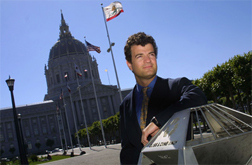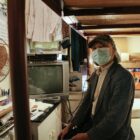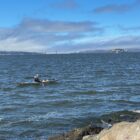Q&A with Jared Blumenfeld, the EPA’s new western states regional director
After eight years as the director of the city’s Department of the Environment, Jared Blumenfeld is leaving the position in January for a bigger job.
Appointed by President Obama, Blumenfeld will head the Environmental Protection Agency’s Region 9 office – a position that oversees various Western states and islands in the Pacific. Blumenfeld has grown his department from a handful to some 120 employees and is credited with passing the city’s much-publicized plastic bag ban and mandatory recycling and composting laws.
Willie Brown appointed Blumenfeld – a young lawyer with British roots and experience running nonprofits – to the position in 2001, launching his career in government. He’s since aimed to make San Francisco an environmental world leader – even engaging in “brinksmanship” with local politicians who had their own environmental agendas.
Question: How do you feel about the appointment?
Answer: Super excited. It was quite a marathon to get the EPA job. I got the phone call from the White House security folks in April and then I did the interview with Lisa Jackson in June. And then the announcement was in November.
The office oversees California, Arizona, Nevada, Hawaii, the border environmental issues, 146 tribal nations, and the Pacific Islands. It’s based out of San Francisco. It has about 900 people in the city.
Q: Anything more you wanted to accomplish in your current position?
A: When I started, we created an environment code. It has 19 chapters. The first chapter is on the precautionary principal. The 19th is on mandatory compost and recycling. So the whole gambit in between from plastic bag ban to green building to integrated pest management to clean-air vehicle code is all there. There’s not that much legislatively that we can still do. Nineteen pieces of environmental legislation is a lot. The majority of what I set out to do, we’ve done.
Q: How do you view San Francisco Supervisor Aaron Peskin’s 2007 proposed legislation to shut down the Department of the Environment after you opposed the plan to build a natural gas-burning power plant near Potrero Hill?
A: Aaron and I actually have a pretty good relationship. And when he was leaving office, like two days before, I said, “You know Aaron, we’ve had our ups and downs and our relationship has sometimes been rocky.” And he was like, “What do you mean?”
I said, “What? Well, you know, when you were trying to delete the Department of the Environment.” And he said, “Yeah, that’s just brinksmanship.”
I appreciate Aaron. I actually like him. Part of the fun of San Francisco politics is that you need to inject, especially from the supervisors, a little bit of fear into the department heads and that was the game he played well.
I think the lesson in San Francisco politics is that it is a little bit of a blood sport, but you can’t hold personal grudges. You have to live to fight another day.
Q: Was there a low point during your last eight years on the job?
A: I have no regrets. Sometimes you need to be told that you’re going in the wrong direction and to realign. At the time, those things like the incident with Aaron seem cataclysmic. And then you wake up the next day and realize life goes on.
The most difficult thing about the job is really … (deep sigh) … getting the consensus to move things forward that are fairly radical. And San Francisco likes to see itself as a radical, progressive city, but it really isn’t.
Q: Who is more radical? Who could we learn from?
A: When you look at Copenhagen or Amsterdam or many cities that are actually progressive on transportation policy, we’re not close. We think we’re great because we’re better than anyone else in the U.S. on most of these things, but that isn’t really a great barometer of progressiveness.
Our transportation emissions are three times what they would be in Amsterdam. On transportation the most important thing is live close to your job.
We’re actually better than them on recycling. We do a better job on waste than most European cities.
Q: What do you make of Obama and other world leaders declaring that no treaty will be signed during the U.N. climate change meetings in Copenhagen next month?
A: I wish it were different, but I don’t think it’s highly likely that we’d get 67 votes in the Senate to pass Kyoto or Copenhagen. So while there’s great hope and a lot of legitimacy in believing that the Obama administration can get a lot more done than any other administration has, it was just too early to get anything done by this December.
Q: Do you have any advice for the person who will fill your shoes?
A: They just have to follow their own path and build coalitions of the willing. This year’s going to be tough. The next ordinance is how we deal with existing buildings – how do you get information to the city and county about every single one of the existing commercial buildings’ energy usage? That’s the most complicated piece of legislation. And, the budget will be a big deal.
Q: What inspires you to do your job?
A: I think it’s critical work, and it can get very depressing, so you have to make it fun. If it isn’t fun, it just becomes too unbearable.
And however bad it is, I live at the top of a hill and I have to bike home. So however angry, however frustrated, you bike up to the top of Twin Peaks and by the time you get home to see your kids, you’re in a good mood.










